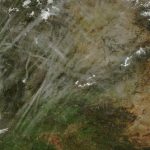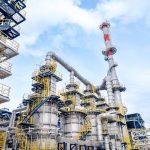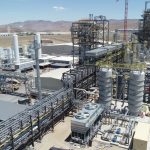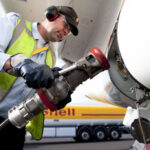Virgin Australia and its new 25% shareholder, Qatar Airways, have announced they will partner with Renewable Developments Australia (RDA), a Brisbane-based company with plans to develop a claimed 100% sustainable aviation fuel by converting bioethanol derived from sugarcane at a new facility near Charters Towers, a regional town in far north Queensland. Subject to final investment approval, RDA plans to construct an ethanol-to-jet (EtJ) plant near the inland town, using cane grown onsite. The company is aiming to produce up to 96 million litres of SAF per year, beginning in 2029, leveraging technologies from multiple international partners, and said it has a written commitment from Boeing to provide policy advocacy and technical expertise. In another Virgin Australia SAF partnership just announced in North Queensland, the airline will source blended fuel from Viva Energy at coastal Proserpine Airport between March and July this year.
The Virgin-Qatar involvement with RDA in the Charters Towers project is part of a broader MoU signed last October by the two airlines to collaborate not just on commercial objectives but also sustainability initiatives to cut aviation’s carbon emissions and progress the use in Australia of both SAF and low carbon aviation fuels.
Virgin confirmed that the two airlines planned to procure SAF from the Charters Towers facility but added that this was “subject to several factors which are commercial-in-confidence.”
The Charters Towers project is described by RDA as being fully integrated, using bioethanol extracted from locally grown sugarcane, and recycling waste from the SAF production process to generate renewable power.
“This unique vertically integrated and energy self-sufficient approach sets it apart from other SAF and EtJ projects globally,” claims the company, describing the current status of the development as at pre-final investment decision stage.
Charters Towers, the location selected for project, is almost 140 kilometres inland from the coastal city of Townsville, the site of another sugarcane-to-SAF project being developed by Jet Zero Australia, with partners including Qantas, Airbus, the Queensland government and US-based alcohol-to-jet (AtJ) SAF producer, LanzaJet. That project aims to produce 102 million litres of SAF per year.
In a website overview, RDA said its feasibility studies highlighted that “biomass security is the key to producing reliable, low carbon and cost-effective renewable biofuels.”
The company said it had selected a site south-west of Charters Towers for its SAF production project with all processing facilities located close to biomass production to reduce risks to feedstock supply and price fluctuation.
“The area provides optimal conditions for biomass cultivation,” added RDA, “with greater sunshine than coastal regions, regular precipitation, sustainable water reserves and protection from adverse weather events such as cyclones.”

The trial farm for the Charters Towers SAF project
Subject to final investment decision, multiple international partners will provide technologies to produce the SAF, which RDA’s early modelling predicts could reduce greenhouse gas emissions by 70% compared to standard jet fuel.
The bioethanol will be produced using technology from Spanish company Tomsa Destil, which engineers and manufactures alcohol distillation plants and derivative products. It will then be converted to SAF using PureSAF technology developed by Swedish Biofuels, which is exclusively licensed to US-based KBR, a global science, technology and engineering provider that has partnered with RDA for this project.
The PureSAF process enables alcohols including ethanol, propanol, butanol and pentanol to be used as AtJ feedstocks in the production of new fuels including SAF.
RDA’s Managing Director, Tony D’Alessandro, said his company’s partnership with Virgin Australia and Qatar Airways was a significant milestone for the development of an Australian SAF production industry.
“This initiative is more than just a step towards decarbonising air travel,” he said. “It represents a major investment in Australia’s energy security and regional economic development.
“Our EtJ SAF facility in the Charters Towers region will be a fully integrated production site, generating sustainable aviation fuel from bioethanol derived from locally grown sugarcane. Additionally, by repurposing by-products of the SAF production process to generate renewable power onsite, we are setting a new benchmark for sustainability in aviation fuel manufacturing.”
Christian Bennett, Virgin Australia’s Chief Corporate Affairs and Sustainability Officer, said the task of achieving net zero carbon emissions by 2050 could not be met by the airline alone.
“Working together with industry partners and government to establish a domestic SAF industry in Australia will be essential,” he said, “not only to achieve these shared emissions goals, but to strengthen Australia’s liquid fuel security by reducing reliance on global supply chains and creating new, secure jobs for those living in regional Australia.
“We are delighted to be working with our strategic partner, Qatar Airways, and the team at RDA to try and bring this project to life.”
Qatar Airways added: “The development of SAF infrastructure and of the fuel itself is of vital importance to the long-term sustainability of the aviation sector, both in Australia and across the globe.”
It also described the initiative as “in the Australian national interest”, a dual reference to supporting Australia’s fuel security ambitions while also jabbing at the Australian government which, while approving Qatar’s investment in Virgin, has blocked the Doha-based carrier’s application for more flights of its own to Australia, citing but not explaining “national interest concerns”.
The Queensland government also welcomed the new partnership, with the Treasurer and Minister for Energy, David Janetzki, endorsing the project, and affirming the government’s commitment to progress the state’s sustainable fuels sector.
Virgin Australia’s announcement of its partnership with Qatar Airways and RDA in the Charters Towers project closely follows another initiative, in which Virgin has agreed to procure SAF from Viva Energy for flights from the North Queensland coastal airport of Proserpine between March and July this year.
Viva Energy, one of Australia’s largest suppliers of aviation fuel, is supplying the airline with blended product containing Jet A1 fuel and a 30-40% synthetic blend component produced from waste and residue feedstocks. Neither the volume of SAF nor its origin was disclosed.
Top photo: Virgin Australia and Viva Energy














More News & Features
SAF One announces new investment and technology partners for Middle East SAF project
New initiative formed to accelerate SAF adoption and production in the Pacific Northwest
EcoCeres opens new Malaysia production facility as SAF ambition in Asia scales up
Aviation, shipping and fuel leaders convene in Rotterdam to accelerate sustainable fuels scale-up
EU SAF mandates will have to be revised, predicts French oil chief
Lessons learned from the collapse of Fulcrum BioEnergy